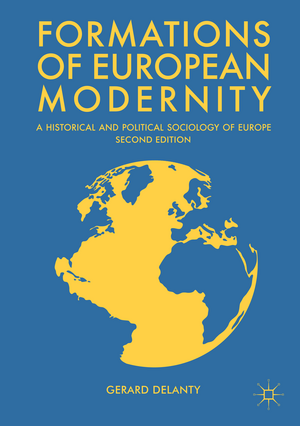Formations of European Modernity: A Historical and Political Sociology of Europe
Autor Gerard Delantyen Limba Engleză Paperback – 7 sep 2018
Now fully updated, Delanty's second edition features commentary on Brexit, populism, the refugee crisis, and secessionism, as well as additional coverage of colonialism and the wider global context. The book will be in an invaluable resource for advanced undergraduates and postgraduate students of historical sociology, the history of Europe, nations and modernity, political sociology, and political and social theory.
Preț: 497.00 lei
Nou
Puncte Express: 746
Preț estimativ în valută:
95.10€ • 99.54$ • 79.15£
95.10€ • 99.54$ • 79.15£
Carte tipărită la comandă
Livrare economică 31 martie-14 aprilie
Preluare comenzi: 021 569.72.76
Specificații
ISBN-13: 9783319954349
ISBN-10: 3319954342
Pagini: 479
Ilustrații: LIX, 479 p. 1 illus.
Dimensiuni: 148 x 210 x 27 mm
Greutate: 0.64 kg
Ediția:2nd ed. 2019
Editura: Springer International Publishing
Colecția Palgrave Macmillan
Locul publicării:Cham, Switzerland
ISBN-10: 3319954342
Pagini: 479
Ilustrații: LIX, 479 p. 1 illus.
Dimensiuni: 148 x 210 x 27 mm
Greutate: 0.64 kg
Ediția:2nd ed. 2019
Editura: Springer International Publishing
Colecția Palgrave Macmillan
Locul publicării:Cham, Switzerland
Cuprins
A Introduction: A Theoretical Framework.- Part 1 Sources of the Europe Heritage.- 1. The European Inter-Civilizational Constellation.- 2. The Greco-Roman and Judaic Legacies.- 3. Christianity in the Making of Europe.- 4. Between East and West: The Byzantine Legacy and Russia.- 5. The Islamic World and Islam in Europe.- Part 2 The Emergence of Modernity.- 6. The Renaissance and the Rise of European Consciousness.- 7. Unity and Divisions in Early modern European History: The Emergence of a Westernized Europe.- 8. The Enlightenment and the Idea of Europe.- 9. The Rise of the Nation-State and the Allure of Empire: Between Nationalism and Cosmopolitanism.- 10. Europe as a World Historical Region: A Global Perspective on the European Formation of Modernity.- 11. The Historical Regions of Europe: Civilizational Backgrounds and Multiple Routes to Modernity.- 12. Europe in the Short Twentieth Century: Conflicting Projects of Modernity. Part 3 The Present and its Discontents.- 13. Europe since 1989: Globalization, Europeanization and the Crisis of the Nation-State in Late Modernity.- 14. Age of Austerity: Contradictions of Capitalism and Democracy and the Crisis of European Integration.- 15. 'The Centre Cannot Hold': The Return of Nationalism and the Specter of Authoritarian Democracy.- 16. Memory, Heritage and History: The European Heritage as a Conflict of Interpretations.- Conclusion: Europe - A Defence.
Notă biografică
Gerard Delanty is Professor of Sociology and Social & Political Thought, University of Sussex, UK.
Textul de pe ultima copertă
This book presents a historical and political sociology of European history and society. It offers a critical interpretation of the course of European history looking at the emergence of the idea of Europe and the formation of modernity.
Now fully updated, Delanty's second edition features commentary on Brexit, populism, the refugee crisis, and secessionism, as well as additional coverage of colonialism and the wider global context. The book will be in an invaluable resource for advanced undergraduates and postgraduate students of historical sociology, the history of Europe, nations and modernity, political sociology, and political and social theory.
Now fully updated, Delanty's second edition features commentary on Brexit, populism, the refugee crisis, and secessionism, as well as additional coverage of colonialism and the wider global context. The book will be in an invaluable resource for advanced undergraduates and postgraduate students of historical sociology, the history of Europe, nations and modernity, political sociology, and political and social theory.
Caracteristici
Offers a synthesized,up to date and comprehensive sociological interpretation of the course of European history Theorizes Europe as an ‘inter-civilizational constellation’ and gives recognition to intra-European plurality, and the global connections constitutive of European modernity Steers a course between the ‘grand narrative’ of Europe and the critique of the ‘dark side’ of European modernity
